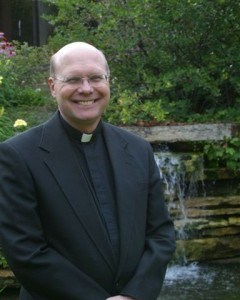Podcast: Play in new window | Download (Duration: 28:18 — 19.5MB) | Embed
Subscribe: Apple Podcasts | Spotify | Amazon Music | Android | Pandora | iHeartRadio | JioSaavn | Podchaser | Gaana | Podcast Index | Email | TuneIn | Deezer | Anghami | RSS | More

Episode 6 “Heaven in Faith” Day 3 Prayer 2 – “You have died and your life is hidden with Christ in God”
Day 3 Second Prayer
11. “You have died and your life is hidden with Christ in God.” St. Paul comes to bring us a light to guide us on the pathway of the abyss. “You have died!” What does that mean but that the soul that aspires to live close to God “in the invincible fortress of holy recollection” must be “set apart, stripped, and withdrawn from all things” (in spirit). This soul “finds within itself a simple ascending movement of love to God, whatever creatures may do; it is invincible to things which” pass away, “for it transcends them, seeking God alone.”
12. “Quotidie morior.” “I die daily.” I decrease, I renounce self more each day so that Christ may increase in me and be exalted; I “remain” very little “in the depths of my poverty.” I see “my nothingness, my misery, my weakness; I perceive that I am incapable of progress, of perseverance; I see the multitude of my shortcomings, my defects; I appear in my indigence.” “I fall down in my misery, confessing my distress, and I display it before the mercy” of my Master. “Quotidie morior.” I place the joy of my soul (as to the will, not sensible feelings) in everything that can immolate, destroy, or humble me, for I want to make room for my Master. I live no longer I, but He lives in me: I no longer want “to live my own life, but to be transformed in Jesus Christ so that my life may be more divine than human,” so that the Father in bending attentively over me can recognize the image of His beloved Son in whom He has placed all His delight.
Elizabeth of the Trinity. The Complete Works of Elizabeth of the Trinity, vol. 1 (featuring a General Introduction and Major Spiritual Writings) (Elizabeth of the Trinity Complete Work) (pp. 97-98). ICS Publications. Kindle Edition.
Discerning Hearts Reflection Questions
We would like to thank Miriam Gutierrez for providing “the voice” of St. Elizabeth for this series
For other episodes in the series visit the Discerning Hearts page for Dr. Anthony Lilles
Anthony Lilles, S.T.D., has served the Church and assisted in the formation of clergy and seminarians since 1994. Before coming to St. Patrick’s, he served at seminaries and houses of formation in the Archdiocese of Denver and the Archdiocese of Los Angeles. The son of a California farmer, married with young adult children, holds a B.A. in theology from the Franciscan University of Steubenville with both the ecclesiastical licentiate and doctorate in spiritual theology from the Pontifical University of Saint Thomas Aquinas in Rome (the Angelicum). An expert in the writings of St. Elizabeth of the Trinity and the Carmelite Doctors of the Church, he co-founded the Avila Institute for Spiritual Formation and the High Calling Program for priestly vocations. He also founded the John Paul II Center for Contemplative Culture, which hosts symposiums, retreats, and conferences. In addition to his publications, he blogs at www.beginningtopray.com .



 Saint Elizabeth’s reflections, as explored by Dr. Lillis, stress the importance of incorporating themes for meditation throughout the day, a practice that aligns with the spiritual exercises developed by St. Ignatius of Loyola. This method of reflection, involving morning and evening prayers followed by meditation, is aimed at fostering a deeper communion with Christ’s transforming love. Elizabeth’s writings serve as a guide for her sister and other believers to internalize divine teachings and apply them to their lives, thereby cultivating a continuous awareness of God’s presence.
Saint Elizabeth’s reflections, as explored by Dr. Lillis, stress the importance of incorporating themes for meditation throughout the day, a practice that aligns with the spiritual exercises developed by St. Ignatius of Loyola. This method of reflection, involving morning and evening prayers followed by meditation, is aimed at fostering a deeper communion with Christ’s transforming love. Elizabeth’s writings serve as a guide for her sister and other believers to internalize divine teachings and apply them to their lives, thereby cultivating a continuous awareness of God’s presence.

 “A fresh and attractive reconsideration of this centuries-old devotion in the Catholic Church. Blessed Basile Moreau (1873), the founder of the Congregation of Holy Cross, who entrusted his priests to the Sacred Heart of Jesus, wrote: ‘The primary purpose of the devotion to the Sacred Heart is to return love for love.’ Fr. Kubicki develops this theme in a way that speaks well to today’s generation of believers.” —Rev. Peter D. Rocca, C.S.C., Rector, Basilica of the Sacred Heart, University of Notre Dame
“A fresh and attractive reconsideration of this centuries-old devotion in the Catholic Church. Blessed Basile Moreau (1873), the founder of the Congregation of Holy Cross, who entrusted his priests to the Sacred Heart of Jesus, wrote: ‘The primary purpose of the devotion to the Sacred Heart is to return love for love.’ Fr. Kubicki develops this theme in a way that speaks well to today’s generation of believers.” —Rev. Peter D. Rocca, C.S.C., Rector, Basilica of the Sacred Heart, University of Notre Dame
 Christ is the bridge to the Father and we cross this bridge by allowing our hearts to be pierced by what the Lord has done for us. The passion of Christ reveals at once the truth about who God is and who we are in his sight. For her, among the greatest blocks to the spiritual life is ignorance. Knowledge of God and knowledge of self go hand in hand in progressing toward spiritual maturity. But the knowing is not simply an intellectual trip. It as the kind of knowing informed by the loving affection of a real friendship. The friendship she describes in tender terms evokes the deepest joys and sorrows all at once.
Christ is the bridge to the Father and we cross this bridge by allowing our hearts to be pierced by what the Lord has done for us. The passion of Christ reveals at once the truth about who God is and who we are in his sight. For her, among the greatest blocks to the spiritual life is ignorance. Knowledge of God and knowledge of self go hand in hand in progressing toward spiritual maturity. But the knowing is not simply an intellectual trip. It as the kind of knowing informed by the loving affection of a real friendship. The friendship she describes in tender terms evokes the deepest joys and sorrows all at once.


